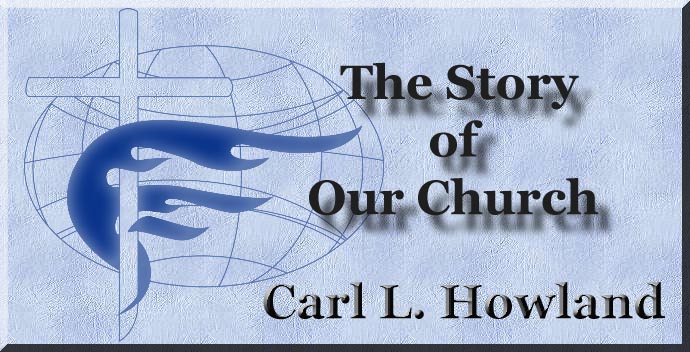
The Story of Our Church
By Carl L. Howland
Chapter 7
Part 2. CHARACTERISTICS1. Doctrine
 HE doctrinal
position of the Free Methodist Church may be described as Fundamentalist
Arminian. There are twenty-three “articles of religion” printed in the
Discipline which furnish the basic creed. From these and the accepted books
of theology of the church—Binney, Field, Ralston, and others—may be stated
the following fundamental beliefs: HE doctrinal
position of the Free Methodist Church may be described as Fundamentalist
Arminian. There are twenty-three “articles of religion” printed in the
Discipline which furnish the basic creed. From these and the accepted books
of theology of the church—Binney, Field, Ralston, and others—may be stated
the following fundamental beliefs:
The Scriptures of the Old and New Testaments are fully inspired and are therefore to be received as the very Word of God. The following declaration concerning the Bible which was adopted by a General Assembly of the Presbyterian Church over twenty years ago would be assented to by the Free Methodist Church: “The Scriptures as we now have them, when freed from the errors of copyists, translators and printers, are the very Word of God and consequently wholly without error.” God exists as a trinity—the Father, the Son and the Holy Ghost. There are three persons of one Godhead. These three persons are “consubstantial, coequal, and coeternal.” Corollary to the above is the acknowledgment of the deity of Christ and the personality and deity of the Holy Ghost. God is the Creator of all things, and made man in His own image, by a separate and direct creative act, exactly as the Scriptures declare. Jesus Christ died vicariously for our sins. Salvation is offered to us not by any works of our own but only through the merits of His atonement. Man is born a depraved creature, incapable of going right or pleasing God except as divine help is given. As conditions of salvation one must repent of his sins, obey the demands of God, whether made known to him by the Scriptures or by the direct dealing of the Spirit, and look by faith to the cross of Christ. There is a possibility of justification by faith, which is always accompanied by the new birth and which may be declared to the individual by the witness of the Spirit. Christ arose from the dead exactly as declared in the Gospels. He is but the “first fruits.” All men will be raised from the dead. There will be a judgment for all men. There will be future and eternal rewards for the righteous and future and eternal punishment for the wicked. The Lord is to return to earth again. The church has not, however, required of its membership commitment as to the mode of His coming. The above fundamental things are theoretically held in substance by nearly all of what are called orthodox churches—Methodist, Baptist, Presbyterian, United Brethren, Disciples, etc., etc. However, “modernists” who reject part or all of the above-mentioned fundamentals now find place in the pulpits, and sometimes even control the conferences and conventions of what are known as orthodox churches. With those loose religious beliefs, associated with the words “liberal,” “evolution,” “modernist,” the Free Methodist Church has no fellowship, believing that evolution is not only contrary to the teachings of the Scriptures but stands absolutely unsupported by a single proven fact of science. “Arminian” theology includes all the above but also follows the doctrine of the great Dutch reformer, Arminius, who believed and taught that God, through the atonement, provided salvation for all men, and that any and all may be saved by meeting the terms of salvation. This is called “conditional election”—election to salvation conditioned only upon the choice of the individual. This Arminian doctrine is the belief of the Free Methodist Church, held in common with many other denominations of the Methodist group. Also central in the teaching of Free Methodism, as it was central in the teaching of Methodism in “the days of her glory,” is the doctrine of entire sanctification as a second work of grace. In the Free Methodist Church the experience is taught exactly according to the teaching of John Wesley and the several other authorities of the Methodist Church from 1750 to 1850. The general doctrinal position of the Free Methodist Church is the doctrine of the original Methodist Church, with nothing added and nothing subtracted.
|
|
 |
 |
|
|
|
-
Site Navigation
 Home
Home What's New
What's New Bible
Bible Photos
Photos Hiking
Hiking E-Books
E-Books Genealogy
Genealogy Profile
Free Plug-ins You May Need
Profile
Free Plug-ins You May Need
 Get Java
Get Java.png) Get Flash
Get Flash Get 7-Zip
Get 7-Zip Get Acrobat Reader
Get Acrobat Reader Get TheWORD
Get TheWORD